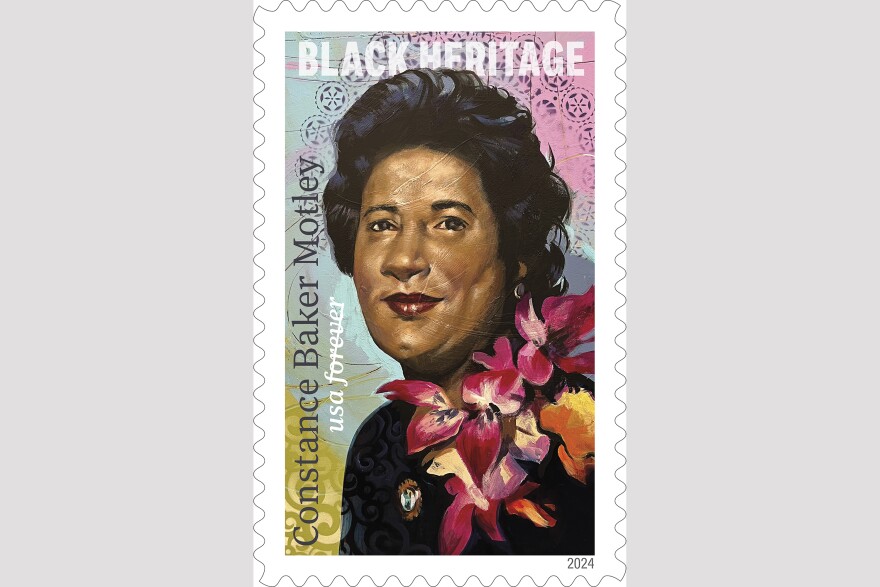Chester's having a party this Saturday to celebrate a stamp. But this party's not about postage — it's about the person on the stamp.
For years Constance Baker Motley lived in a pre-Revolutionary War country house in this small Connecticut River Valley town.
“She loved history, and in fact she did become very involved with local events,” said longtime Chester resident Marta Daniels. “She was a founding trustee of the Chester Historical Society.”
Daniels said Baker Motley was a friendly figure whom neighbors knew – vaguely – was an accompished woman.
“We only knew her as ‘the judge from New York,'” Daniels said. “I was here 15 years when she was still alive. And I just was shocked, after she died, to read about her history — because she never talked about her own past.”
During her life, this so-called “judge from New York,” served as a federal judge for the Southern District of New York. She was the first Black female federal judge in American history.
That accomplishment alone might have been enough to earn her the rare honor she received posthumously this month from the U.S. Postal Service, which made Motley the 47th person ever to be featured on a Forever "Black Heritage" stamp.
But as Daniels hopes the people who attend this Saturday’s celebration in Chester for Motley’s Heritage Stamp learn, Constance Baker Motley achieved so much more.
“She was the first brief filed on behalf of the Brown vs. Board of Education Supreme Court decision that was in 1950,” Daniels said. “And by 1954, the court had ruled unanimously that, ‘Yes, segregated schools were unconstitutional.’ So she got that ball rolling."
"Then she was tapped by Thurgood Marshall, to go to the Deep South — and for the next 10 years, be the public face to enforce Brown vs. Board of Education," Daniels said. "She ended up doing over 200 civil rights cases during that time period."
"It was then that of course, she also had to go back to the Supreme Court. She argued not only the first case, but she argued 10 [cases] in her role as a civil rights attorney, and she won nine out of the 10. And the tenth one, they reversed themselves 20 years later. And so, she won all 10," Daniels said.
Motley was a native of New Haven, where she graduated from Hillhouse High School. She and her husband bought a house in New York City’s Harlem during her years on the federal bench.
So, how did this Black woman with urban roots wind up living 40 years in overwhelmingly white and rural Chester? Daniels said that has everything to do with another New Haven native, and successful industrialist, who made her rise to prominence possible.
“She understood, from her own experience, about a man named Clarence Blakeslee, who was the hidden funder behind Camp Hazen YMCA camp in Chester, founded in 1920-21,” Daniels said. “As an integrated camp, that was astonishing. Back then she knew about that because this man had funded her education. So she knew that this was a town that would not be a town that would be unwelcoming.”
This Saturday, Feb. 17, the Town of Chester is inviting people to The Chester Meeting House, from 3-5 p.m., for a celebration of the release of Constance Baker-Motley’s new Forever Black Heritage Stamp. With possible snow forecast, celebration organizer Marta Daniels encourages people interested to check here for any possible weather-related adjustments.





